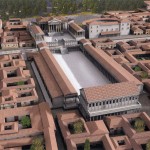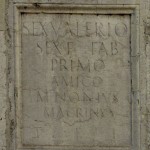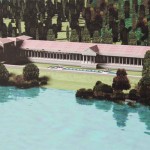Nonii Arrii family on Benaco
Nonii Arrii family in Toscolano and on lake Garda
Labus (Giovanni Labus) fund mentioned perhaps 40 marble in Brescia and Verona province this family among the most distinguished of the cisalpine colony for the number of customers, following slaves and liberties, for brilliance of attinences, for the height of burdened positions, for magnificence in the factories and for exterminated riches. Doctor Claudio Fossati, an illustrious scholar of the ancient relics of this land, remembers eleven Roman consuls among the Nonii and three of the Arrii (another important Etruscan family with which the Nonii joined); the only name of their villas and lands in Lombardy, Verona province, Istria, around Rome, Campania, Calabria, Apulia, Africa, Spain would form an endless list. In Brescia province they had their possessions in Valcamonica, Lake Idro, S. Eufemia, Isorella, Pollicino, Urago Mella, Mompiano and Vico Muciano, Lograto and more.
Nonii family
On Riviera their properties extended from Carzago, Bedizzole and Muscoline to Castel Toblino and to Arco in the Trentino Valley. In Maderno they had to have the property of Vicus Macrinus, which has now been transformed into two fertile and sunny contiguous soils of Vigole and Marciino, whose names repeated, according to Fossati, that of Marco Nonio Macrino, the father of the Muciano Consul. These powerful Latins, bound by blood and friendships with the emperors Flavia and the Antonini families, dedicated statues, tombstones, temples, sacrileges to Commodo, Settimio Severo, to Claudio Gotico with expressions of plaudity and tribute or fake True, sometimes even worshiping cruel emperors, in which almost always uses the name Benacenses. We like to remember that the same powerful family of the Nonii Arrii prevailed in Brixia where erected the Vespasian Basilica, the Curia and the Forum, in the square that still calls his name transformed into the vulgar Noari.
 The Labus (Giovanni Labus) assures us that under the reign of the First Emperor (Ottaviano Augusto 27 BC – 14 AC) the powerful patriarchal family of the Nonii, originated in the Republic period, was established in Brescia province.
The Labus (Giovanni Labus) assures us that under the reign of the First Emperor (Ottaviano Augusto 27 BC – 14 AC) the powerful patriarchal family of the Nonii, originated in the Republic period, was established in Brescia province.
At that time lived a Publius Nonio Asprenate that in year 7 B.C. was defending the Rhine river to defeat the Germans already winners in Teutoburg, when in immense envelope led by Arminio, they did a massacre of the three Legions of Quintilio Varo and Augustus, mad, crying and imploring: “Varo, give me back my superb legions!”. Augusto gived to Asprenate the lands of Benaco Riviera; furthermore, repressed the enemy’s pride with shining victories, enriched the family with the fat spoils collected on the battlefield .
Elected to the Consulate in 38 A.C. he showed himself enemy of every tyranny, and conspiring against the crazy Caligula, heroically felt into the tumult that had arisen to overthrow it.
 Magnanimous and modest appears Marco Nonio Macrino, the companion of Emperor Vespasiano in arduous military campaigns, friend of Persio and Plinio who perhaps came to delight in these places; later intimate and adviser to Tito with whom he divided the dangers of the Jewish war by fulfilling the prophecy of Christ in Jerusalem. After the noble rejection of all honor, he retired to private life on the Riviera, where he tied his name to Maclino, now hamlet of Maderno.
Magnanimous and modest appears Marco Nonio Macrino, the companion of Emperor Vespasiano in arduous military campaigns, friend of Persio and Plinio who perhaps came to delight in these places; later intimate and adviser to Tito with whom he divided the dangers of the Jewish war by fulfilling the prophecy of Christ in Jerusalem. After the noble rejection of all honor, he retired to private life on the Riviera, where he tied his name to Maclino, now hamlet of Maderno.
The Labus writes that Arria, wife of Marco Nonio Macrino, “was in Rome in the thanksgiving of Settimio Severo for the friendship he had with his husband and for the admirers of her quality, assiduously reading Platone’s works of which she was delighted, and conversing with wises, especially with Galeno, who was dear to him. And because he was subjected to many maladies so that she was in danger of succumbing to ventricular inertia, Severus, who together with his son Caracalla was delighted in medical science, prepared a drug that healed her. The cultured woman, who came to the groom’s house in Brescia, sent her to breathe better airs on Benaco, where he wanted to dedicate a statue and a temple to the gods “for gratitude for having restored her to health.”
In the Museum of Verona a marble, carried by Maffei in 1745, contains this epigraph: “Marco Nonio Macrino – Consecrated to – Conservatives Gods – For the health of his Arria.”
Since the last glories of the Nonii reach up to the fifth century, probably the Villa of Toscolano was inhabited by members of the illustrious race of the Nonii until that time. In fact still in 330 a.C. L. Nonio Vero was the Coroner of the Venetians and Istria; in 397 a.C. Tito N. Attico was consul, and in 445 a.C. it was a Titus Nonio.
The villa of Toscolano is populated by many figures who animated an inextinguishable period, among which emerges that of Muciano, quindecemviro for the sacred things that begins the period when the Arrii family shrinking with the Antonini family and especially with Marcus Aurelius, Emperor who married Faustina, the nephew of Arria Fadilla. Another Marco N. son of Macrino was commander in Pannonia, and with his legions proclaimed as emperor the wise and valiant Settimio Severo, taking him on the shields after the death of Commodo, whose fame was condemned and cursed by the Senate.
 Among the buildings that adorned the Villa was a splendid temple of the Lari of Augustus, a work of the first century. Digging the rubble came in the light of a lintel with dedication « Augustibus Laribus ». With it the Nonii placed under their imperial guard their possessions, invoking the benevolent protection of their descendants. This cult was held by a rich, honored, illustrious group. Many inscriptions found, in addition to Toscolano, also at Bedizzole, Moniga, Salò, Tremosine mention the existence on the riviera of a Augustus Sestoviri organization. It is also noted by two marbles discovered in the villa that a Caio Valerio Mariano “Sodalis Sacrorum Tusculanorum” and the consul Marco Aurelio Menofilo, distinguished with the quality of “Sacerdos Tusculani”, were both part of the priestly institute. The illustrious Caio Valerio Mariano reminds us of the relationship between the Nonii Arrii family, thanks to Arria Ermionilla, and the noble family of Valerio Catullo, the lazy poet who lived and sang at the time of Caesar in the prospectus peninsula, in Sirmio, gem embedded in the Benaco Cup.
Among the buildings that adorned the Villa was a splendid temple of the Lari of Augustus, a work of the first century. Digging the rubble came in the light of a lintel with dedication « Augustibus Laribus ». With it the Nonii placed under their imperial guard their possessions, invoking the benevolent protection of their descendants. This cult was held by a rich, honored, illustrious group. Many inscriptions found, in addition to Toscolano, also at Bedizzole, Moniga, Salò, Tremosine mention the existence on the riviera of a Augustus Sestoviri organization. It is also noted by two marbles discovered in the villa that a Caio Valerio Mariano “Sodalis Sacrorum Tusculanorum” and the consul Marco Aurelio Menofilo, distinguished with the quality of “Sacerdos Tusculani”, were both part of the priestly institute. The illustrious Caio Valerio Mariano reminds us of the relationship between the Nonii Arrii family, thanks to Arria Ermionilla, and the noble family of Valerio Catullo, the lazy poet who lived and sang at the time of Caesar in the prospectus peninsula, in Sirmio, gem embedded in the Benaco Cup.
